Some often overlooked but simple lessons that can make a huge difference when living off grid
Having lived off grid for over 10 years, we have run across some small lessons that I've not seen or heard from many people but can save time and frustration. So here is a quick list on what we over looked at times but appreciate a lot now that we figured these things out.
When it comes to lighting a fire, I love the strike anywhere matches. We tried those safety matches that require the match to be lit using the strike plate on the box ... crap. We have also tried all kinds of butane lighters ... crap. Paper book matches ... crap. What I would love to try is a flint. Perhaps one day I will find one. But until then, the strike anywhere matches are gold. Not surprisingly, they are also getting harder and harder to find. It seems that the stores don't like to carry them much any more. So if you find them, buy in bulk!
Buying chain saw? Don't cheep out. I found that the cheaper models that you get at the box stores don't last that long. When you are in the middle of winter and need fire wood, you need your saw to work. So I purchased as Stihl chain saw and have not been disappointed as it runs reliably for YEARS. I find the same goes with a generator. I love the Honda generators. They work hard and long with little to no maintenance required.
On the topic of chain saws, I sharpen the chain with a stone that can go in a dremel or drill. Except the sharpening stones break really easily. I found out that they make diamond bits for sharpening carbide tipped chainsaw chains. They last long enough to sharpen the life of at least one chain rather than just getting you through a single sharpening. So even though they are more money, in the long run they work better, last longer and saves a lot of frustration.
To save our solar system from the phantom power consumption of a lot of electronics, we put switches on our plugs. That way we can turn off all the power bars, lights, computers, phone chargers, etc without going along each circuit and unplugging everything or flipping breakers at the panel. Yes, most of those items will consume power even when turned 'off'. So we just wired our house so that we can turn off the wall plugs with a simple switch.
We keep our deep freeze outside in a shed rather than in the house. During the winter, our capacity to generate power is really low due to the limited sunlight. But the good news is that winter can keep our food frozen with zero power ... because it is flippen cold during the winter. So old man winter does the job, so we turn the deep freeze off during the winter. When we have lots of power during the summer, we then turn it back on. Does not make sense to us to run a deep freeze when winter does an efficient job!
We purchased a front load, energy efficient, water saver washing machine. I don't recommend them. If you buy a machine, get a top load as they work better! When ours dies, a top load machine is what we would be looking to get.
As for drying our cloths, we build a solar and wind powered cloths drier ... yes ... and old fashioned cloths line. They will dry your cloths even when it is -35C out side. But in the winter, we hang our cloths in the house as it also helps increase the humidity in the house to keep it from getting too dry.
We heat water on the stove. We have yet to justify the cost of a hot water heater or on demand heater. We may eventually make a solar heater ... one day. Until then, heating water serves us very well. It is simple and easy.
We really struggled finding milk filters to filter the goat milk after each milking. We find that the white coffee filters work fairly well. We have to make sure we filter the milk right away, otherwise the milk thickens and won't flow through the filter. Timing is important, but at least it is easy to find filters now.
If we run low of water in the winter time, we often melt snow to do dishes or shower, saving the clean, potable water to drink. We will also melt snow for the animals too if push came to shove. Lots of water around, we just need to find ways to capture and use it.
With wood heat, we left a 6 inch gap between the top of our walls and the ceiling. This allows the heat to flow to all areas of the house where it then cools off, drops to the floor and then flows back to the stove. That way we don't need any fans to move the warm air around the house. In the days before force air heating, there would be small windows above the doors that can be opened. This allowed heat to flow into a room if needed.
We build our wood sheds out of pallets. They work great as it allows the air flow to go through the wood stack, drying and curing the wood very quickly, even in the winter time.
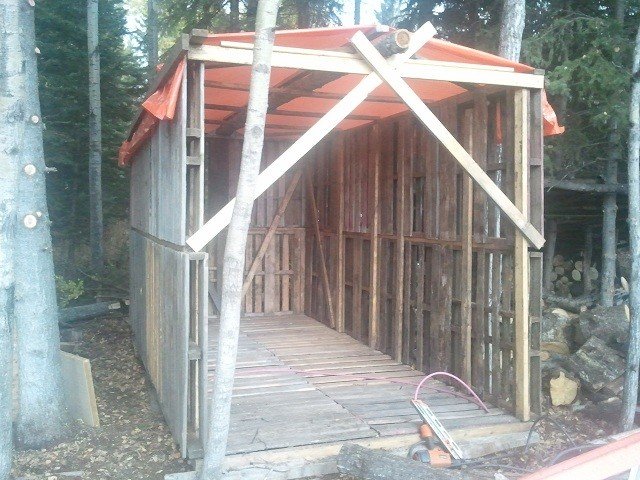
Our wood shed that holds 8 cords of wood. I've since put a tin roof on this building.
Did you know that the blade and bottom of a blender will fit on a mason jar? That way we can make our own, personalized size smoothy.
For sharpening knives, we have tried stones, the disk sharpeners and other techniques. I find this tool to be the easiest, quickest and best way to sharpen knives.
When it comes to cooking food, cast iron is the only way to go!
Yard lights usually consume hundreds of watts of power, so we could not go that route. What we did instead was string up some LED Christmas lights connected to a switch in the house. Now if we need to go outside in the winter time, we just turn on the lights so that we can see where we are going. When we get back into the house we can then turn them off. The LED light on our cell phones also makes a great flashlight when walking around in the dark.
To help keep water for the live stock, we keep a 250 gallon tote in the shop which we can then heat up to keep it from freezing. We don't have a well, so we can pick up 200 gallons of water for a dollar at the local county well. It is not portable water, but it is well water which is fine for the animals.
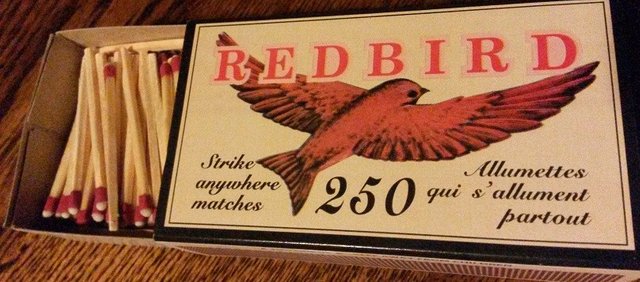
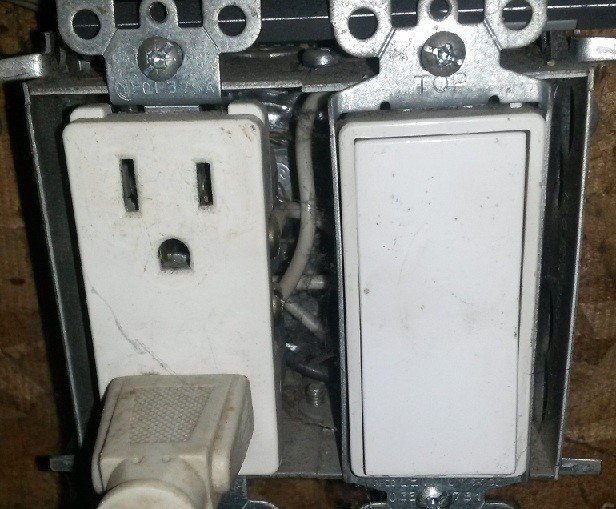
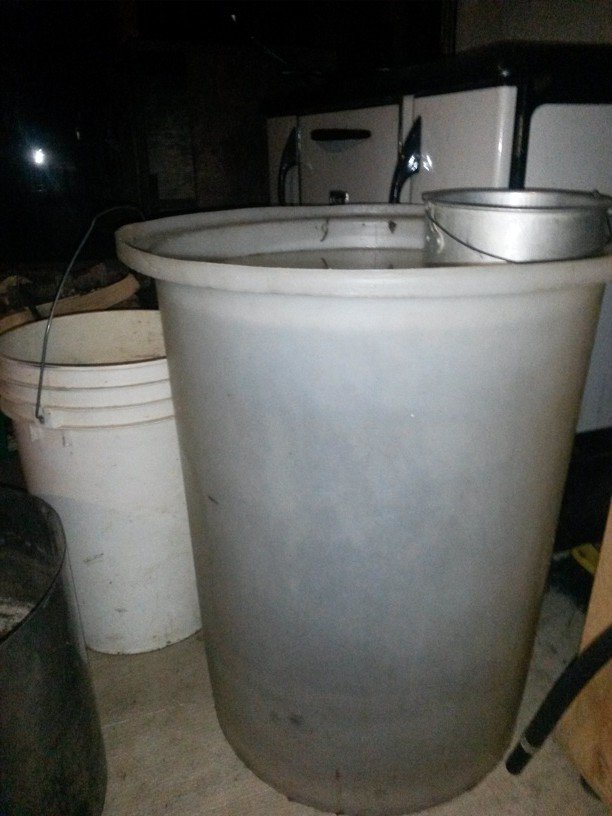
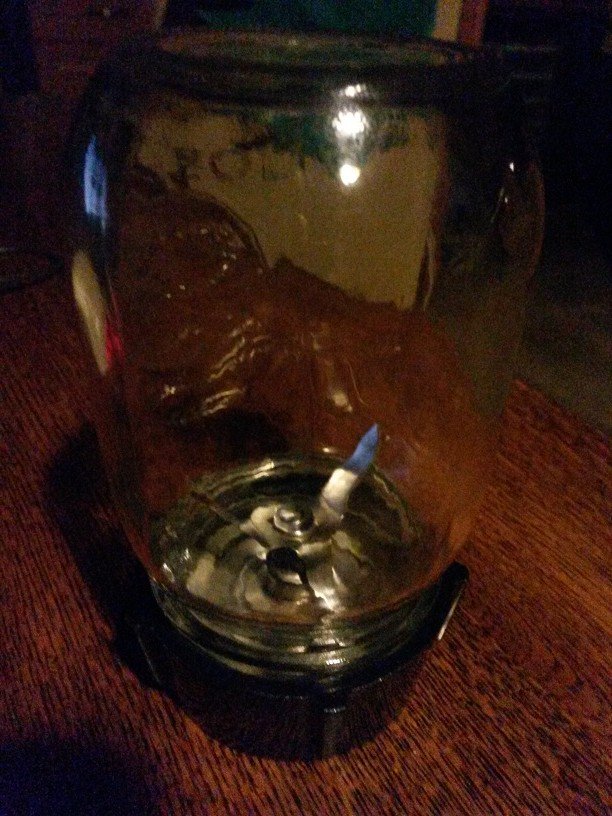

Some extremely useful tips.
One I have learnt the hard way, and now am particularly keen to follow, is buy to last. It is always worth spending an extra 10-20% now to get a good model or brand that will last, than having to keep buying new every 12 months.
And I do like the idea of using pallets for the woodshed.
Thank you.
Yes, that is what we do as well. It does not make sense to buy cheep. The cheep stuff is designed for planed obsolescence, which means it is designed to fail after a short period of time to force the consumer to go buy another one as repairs will end up costing more than the replacement. With that said, we also fix everything we can to avoid having to surrender to that planned obsolescence too!
I'm glad you enjoyed the share! Thank you for your comment as it is also helpful to others! Bravo!
I always wonder how many things are designed to last just 13 months - just after the warranty ends 😊
When I took the project management course, I found out something very interesting about extended warranties. Statistically they have a certain percentage failure rate when a product line is first manufactured. Then it levels off for a period of time ... which is engineered! Then after that period of time the failure rate goes up significantly. The normal warranted covers that first batch of failures. The extended warranty covers any failures through that level off period. It is nothing but a cash cow for the manufacturer as they know the statistics and can rake in the cash on peoples fear. The things we don't learn in school eh!
I don't usually take the extended warranty option - they seem too expensive for what they offer. Particularly as they often have a whole bunch of caveats in the small print.
Hi pennsif, I liked your comment and can relate so I upvoted and am now following!
@dakini5d
If you keep pallets out of the weather they last nearly forever especially if you can get the really good heavy-duty pallets like they use for moving cement or concrete mix. Maybe you can get some of the good heavy oak ones from Lowes/Home Depot but it may cost you some because pallets can be returned for a refund though I think that there aren't many people (not businesses) who do return them. Everyone needs a pallet or 2.
You might also want to lay some gravel before you put the pallets down so that they don't sink into the dirt with the weight of the firewood and the grass and weeds that may grow up around them. It would keep them in better condition for longer.
Recycle, reuse, and reduce the waste then build to last!
Wonderful post wwf! As a country bumpkin I can relate! Upvoted, following and suggested for @originalworks upvote!
@dakini5d
The @OriginalWorks bot has determined this post by @wwf to be original material and upvoted(1.5%) it!
To call @OriginalWorks, simply reply to any post with @originalworks or !originalworks in your message!
Thank you! From one country bumpkin to another! Woooohooooo <3
You have a whole list of very practical tips, @wwf. We use most of them here on the homestead but there were a few new ones too. Thanks for sharing.
Did I miss any that you are willing to share?
They were new tips for me. Some of the things we use here may not be useful on a homestead in the north. Like a good all purpose machete. And we don't be appliances with electronic features as the salt in the air here corrodes them and they become useless after about a year.ie no automatic coffee makers or toasters.
Oh man! It took me forever to learn how not to burn toast when cooking it without a toaster!
I still burn mine on occasion. lol
I did not write about the toaster, but I put a large lid from our wok over top of the toaster. It keeps the heat in and toasts 5 times faster. On our propane stove, it saves a lot of gas. On the wood cook stove, toast is ready in 30 seconds! Faster than an electric toaster.
That's great idea. Thanks for the tip.
WOW! I wish I'd had this info when we first moved off grid! It took us some 'assess, adapt, and overcome' before we came up with some of them!
We started with the matches but we modified that one to keep a can of mapp gas to light our wood stove
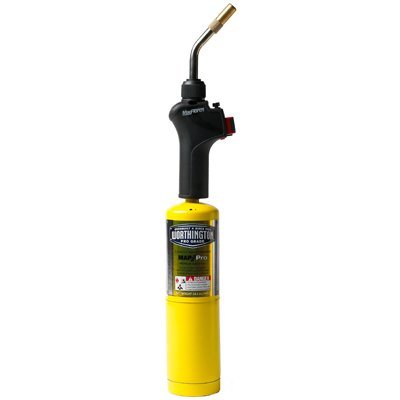
The kindling lights super fast and it's very forgiving of a less than perfectly laid fire (just between us, my man has gotten pretty lazy about laying it right 😉). The one can of gas can last for a full year.
P.S. tracing those electrical 'leaks' can really be a huge pain, eh?
hahaha. You know it. I look at my solar system and see something chewing a few hundred watts. Then the hunt is on to figure out what it is.
That is cool. Never thought of using those. I'll look into the cost, but for the most part, matches work well for us. We are content. I will want to get a flint. I think it would work well for what we do here. I believe in simple being best!
If you want to find a good flint, try looking at Lee Valley Tools, www.leevalley.com/en. I used to shop in their online store for these types of goodies for the homestead. A little harder now since I am living in Central America. Importing stuff ca be a real bear sometimes...
Thank you. I forgot about Lee Valley. I heard they have very good tools. Thank you for the reminder!
You are welcome!
The strike anywhere matches are amazing, but I can't find them anywhere anymore. Any name brand places selling them?
Amazon sells them in bulk.
Canadian Tire is where we purchased our last batch of matches. Otherwise, they are getting harder and harder to find.
I checked out your blog. Reporter eh! Welcome to my blog. I hope you are enjoying it. I'm following your work now. Thanks for making the connection. I agree with much off what you are writing about. I've been warning people for years and that is why I am so passionate about off grid living. Being able to support oneself when it all tanks is the best investment one can make: in health, knowledge and skills on how to provide the basic necessities of life! I look forward to reading your posts!
what about cheese cloth for filtering goats milk?
Cheese cloth has too many big holes to let the dirt through. We did not care for it at all. Carey is particular about making sure the milk is clean. no dust, dirt, hairs, etc can get through. Cheese cloth did not filter that well.
really?
Even with 4 or 5 layers?
Sorry. Even the cloth style cheese cloth still let some of the dirt through. The coffee filters work way better. We also had challenges with keeping the cloth clean and sanitizing it for multiple uses.
duly noted. :)
Good tip I wouldn't have thought of.
well that's disappointing. :(